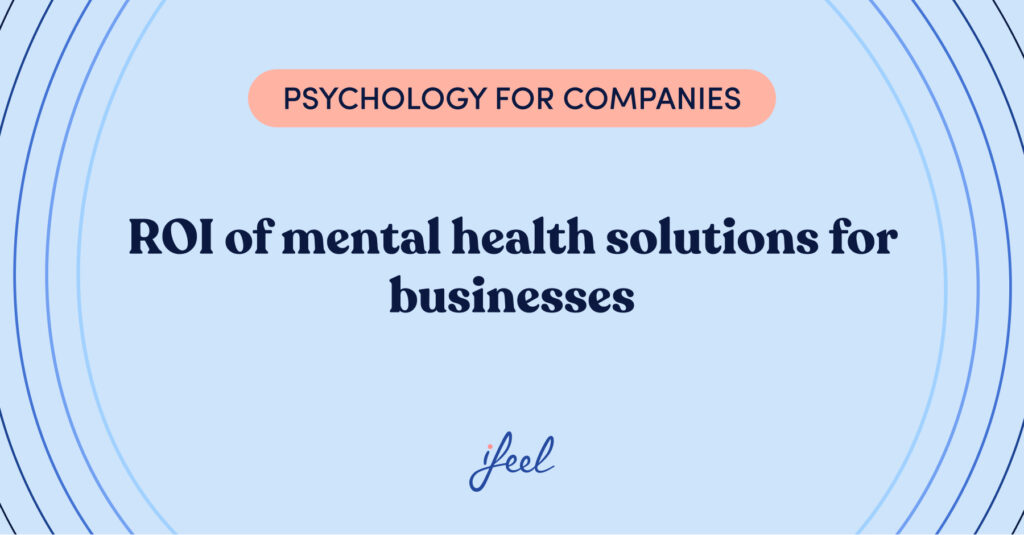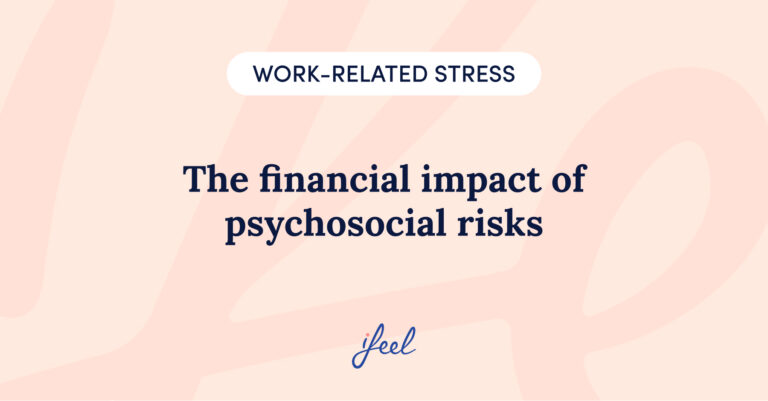In the business world, every decision must be supported by data and measurable results that justify the investment. For these decisions to deliver tangible returns (ROI), it is essential to have a committed and productive workforce capable of maximising the resources provided by the company.
In this context, mental health has become essential to ensuring that employees, who are the driving force behind any organization’s success, remain productive. But a key question arises: How can a company effectively support its employees while ensuring that this investment is financially profitable and delivers a strong ROI of mental health solutions?
The key lies in finding mental health solutions for companies that offer an innovative, scalable methodology tailored to the specific needs of each organisation, maximising the ROI of mental health solutions.
After all, if the mental health of those who drive business results is at risk, so is the success of the company. In fact, according to the World Health Organisation (WHO), mental health problems have a global economic impact of approximately $1 trillion per year, due to phenomena such as absenteeism and presenteeism.
However, companies that adopt innovative solutions, such as ifeel, are at the forefront of this issue, as they not only improve their employees’ well-being but also see tangible benefits in their bottom line and an exceptional ROI of mental health solutions.
In this article, we will explore how ifeel can transform mental health into a competitive advantage for your company, helping you reduce costs, improve productivity, and foster a healthier organisational culture.
At ifeel, we have designed this exclusive guide specifically to help enterprise organisations make financially smart decisions when selecting mental health solutions for businesses. Download it for free here.
The financial impact of mental health on businesses
Mental health issues not only affect employees’ well-being, but also have a direct and significant impact on the productivity and operating costs of organisations. These issues generate two main types of costs:
- Direct costs: These include medical expenses, therapy and mental health-related insurance. These costs are visible and reflected in the budgets allocated to employee healthcare.
- Indirect costs: These arise from phenomena such as lost productivity, absenteeism, presenteeism and employee turnover. Although less obvious, these costs have a much greater impact on companies’ bottom lines and influence the overall ROI of mental health solutions.
For example, it is estimated that 30% of sick leave in Europe is related to mental health issues, which has a significant financial impact on organisations. In addition, presenteeism, where employees are physically present but not fully productive, can cost between 2 and 3 times more than absenteeism.
A typical case is that of high-risk employees, who represent only 5% of the workforce but generate exponential costs due to long-term absences and lower performance. This group, although small, can become a critical financial challenge if preventive measures are not taken.
Therefore, one of the most strategic decisions a company can make is to prevent mental health problems before they arise. Investing in innovative and proven solutions not only protects the well-being of employees but also reduces costs, improves productivity, and strengthens the financial sustainability of the organisation.
The Leadership Lens🔎
Did you know that for every euro invested in mental health programmes, companies see an average return of €4 in productivity, reduced absenteeism and lower staff turnover? This is a clear demonstration of the powerful ROI of mental health solutions. As a leader, your involvement is key to maximising this ROI.
Promote clear policies that prioritise mental wellbeing, measure the impact of initiatives with tangible metrics and, above all, be a role model in using the resources available. Remember: investing in your team’s mental health is not only humane, it is also strategic. A mentally healthy team is a more committed, creative and resilient team.
ifeel’s approach: data-driven ROI
Unlike traditional Employee Assistance Programmes (EAPs), which have been the predominant option for addressing mental health needs in companies but have multiple limitations as they do not effectively adapt to the specific needs of each organisation, ifeel is positioned as a strategic ally to transform this approach. Find out more here.
With an innovative model, ifeel combines advanced technology, data analysis and clinical expertise to deliver scalable, personalised solutions that maximise return on investment (ROI) in mental health. Its main features include:
Here is your content formatted into a clean table:
| Function | Benefit |
|---|---|
| Diagnosis within 24 hours | Reduced waiting times and prevention of unnecessary absences. |
| Personalised plans | Solutions tailored to each risk level (low, medium, high). |
| Real-time analysis | Identification of risks and trends for informed decisions. |
| Global coverage | Available in more than 30 countries and 25 languages, ideal for multinational companies. |
| Measurable financial impact | Specific metrics to evaluate cost savings and ROI of mental health solutions. |
How does ifeel help reduce costs? 3 key points
Companies that implement solutions such as ifeel can reduce costs associated with mental health by between 15% and 25%, according to internal data. This is achieved through:
- Reduction in absenteeism and presenteeism
- ifeel‘s clinical model enables the identification and treatment of high-risk cases within 24 hours, thereby avoiding unnecessary absences and enhancing operational efficiency.
- Reduction in employee turnover
- Staff turnover is one of the biggest costs for companies. According to ifeel, companies can save between £15,000 and £50,000 for each high-risk case managed effectively.
- Prevention of future costs
- Preventive solutions, such as workshops and psychoeducational content, help identify problems before they become crises, reducing intervention costs by 50%.
The key to ifeel’s success lies in its ability to adapt to the specific needs of each company. Its data-driven methodology allows it to identify areas of significant impact and design customised strategies to address mental health issues effectively.
Additionally, its ROI calculator enables companies to quantify the financial impact of their mental health investments, facilitating informed strategic decision-making.
Success stories: Real impact on large companies
The effectiveness of ifeel is reflected in the results obtained by companies that have integrated this solution into their wellness strategies. For example, a pharmaceutical company achieved:
→ Reduction in absenteeism from 11% per year to 8%.
→ A decrease in annual mental health costs from €23.2 million to €18.62 million.
→ A decrease in the percentage of employees classified as high risk by 7%.
→ Increase in employee engagement by 30% and productivity by 20%.
→ Savings of €4.65 million in the first year and a cumulative projection of almost €14 million over three years: demonstrating outstanding ROI of mental health solutions.
Read the full success story here and discover how a transformative cultural impact was achieved by reducing the stigma associated with mental health and fostering an inclusive and resilient work environment.
Checklist for senior executives: How to choose the best mental health solution?
Before making any decision, it is essential to assess whether the mental health solution you are considering meets the essential criteria to maximise its impact on your organisation. Here are the key points that every company should consider when selecting the mental health solution that best suits its business.
- Clear financial impact: Can you measure cost savings and ROI?
- Scalability: Is it suitable for the size and geographical distribution of your company?
- Technological integration: Can it be easily integrated with your current systems?
- Fast results: Does it offer diagnostics and action plans in less than 24 hours?
- Ongoing support: Does it provide real-time analysis and clinical advice?
At ifeel, we have designed this guide specifically to help large companies make financially smart decisions when selecting mental health solutions for businesses and get the best ROI. Download it for free here.

Mental health as a strategic investment
For business leaders, choosing ifeel is not just a wellness decision, but a sound financial strategy. With its focus on data, personalisation and measurable results, ifeel transforms mental health into a competitive advantage, helping companies save costs and improve productivity.
Ready to take the next step? Request a personalised demo and discover how ifeel can make a tangible impact on your organisation.







